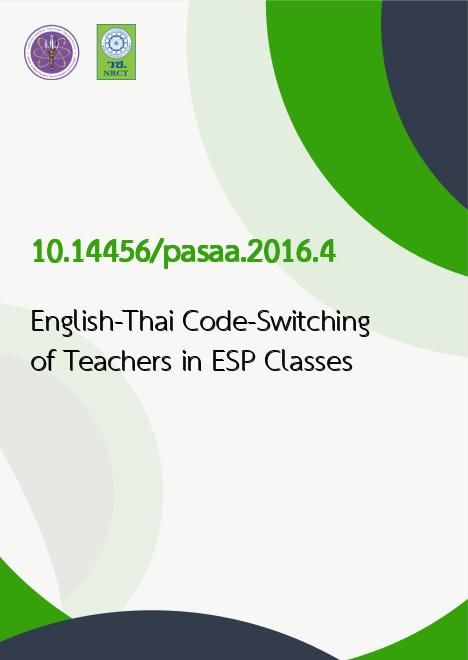
|
English-Thai Code-Switching of Teachers in ESP Classes |
|---|---|
| รหัสดีโอไอ | |
| Creator | 1. Korawan Promnath 2. Chamaipak Tayjasanant |
| Title | English-Thai Code-Switching of Teachers in ESP Classes |
| Publisher | สถาบันภาษา จุฬาลงกรณ์มหาวิทยาลัย |
| Publication Year | 2559 |
| Journal Title | PASAA : a journal of language teaching and learning |
| Journal Vol. | 51 |
| Page no. | 97-126 |
| Keyword | code-switching,English for specific purposes,Target language,Students' mother tongue |
| ISSN | 2287-0024 |
| Abstract | The term code-switching (CS) that occurs in everyday situations, or naturalistic code-switching, has been a controversial strategy regarding whether it benefits or impedes language learning. The aim of this study was to investigate CS in conversations between teachers and students of ESP classes in order to explore the types and functions of CS usually used in the teaching and learning process, and to investigate the teachers' and students' opinions about CS in classroom practice, particularly in English for nursing and tourism classes. The study found that code-switching was one of the major strategies in these ESP classes. CS in the teaching process could be categorized according to the following: inter- sentential switching, intra-sentential switching, extra-sentential switching, and code selection. The CS functions were both pedagogical (asking questions, giving explanations, translating, and emphasizing ideas) and social functions (directing,reminding, injecting humor, and encouraging students).The majority of the teachers demonstratedpositive opinions about CS and agreed that CS fromEnglish to Thai could benefit their classes, as it is oneof the most effective strategies for helping theirstudents obtain clear ideas on the subject matter. Thisstrategy not only made the students understand moreof the lesson but also increased their confidence andcomfort in the teaching process. The CScharacteristics and opinions found in this study mayprovide a guideline for language teachers andpolicymakers, especially in EFL countries in the AECand in this global era. |
